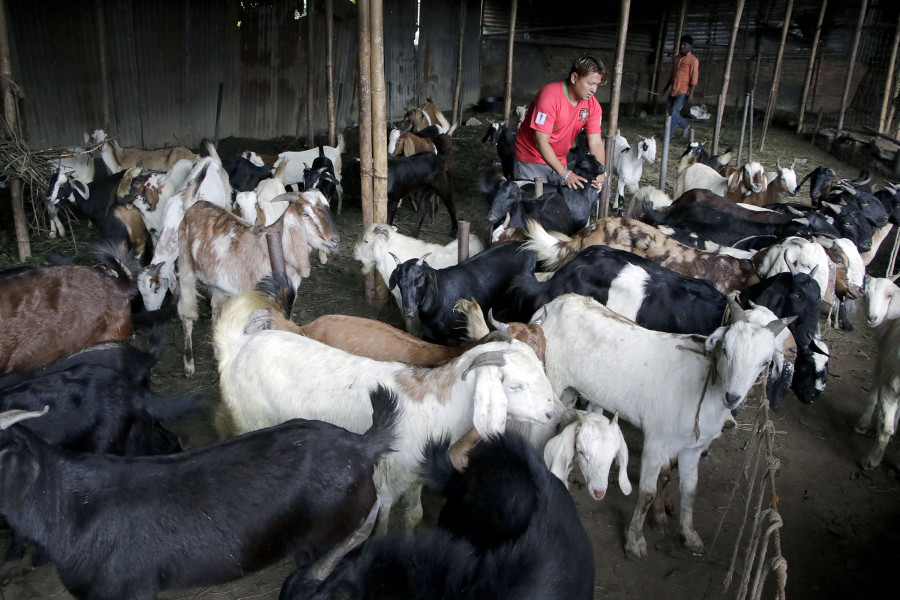Money
Domestic goat production adequate to fulfil festival demand, livestock traders say
Last year, imports from India made up for the shortfall in domestic production ahead of the Dashain festival, records show.
Krishana Prasain
Livestock traders say domestic goat production is adequate to fulfil the requirement of the Kathmandu Valley for the coming Dashain festival.
"There will be no issue regarding goat supply during this festive season as domestic production is sufficient to cater to demand," Banshi Sharma, director general at the Department of Livestock Services, told the Post.
“Almost 95 percent of the Dashain goat demand last year was fulfilled by domestic production, and the shortfall was filled by imports from India," he said.
Based on past records, around 10,000 goats are sold daily in the valley from the first day of Dashain to the eighth day. Total sales during the festival come to around 100,000 goats, Sharma said.
The goats sold in the valley are brought from Itahari, Kohalpur, Nepalgunj, Dang, Makwanpur and Nuwakot, among other places. Mountain goats come from Humla, he said.
“If any trader says that local output will fall short of demand and animals will have to be imported from India, I have a list of names and receipts for 140,000 goats. We also have data about the goats possessed by farmers,” said Sharma. Nepal can even export goats to India, he added.
The price of goats will not rise this Dashain as there is adequate supply, he said.
Janak Kumar Khadka, president of the Kalanki Khasi Bazaar, Kalanki, said that traders will not need to import goats as in the past.
Kalanki Khasi Bazaar, one of the largest livestock markets in the valley, receives around 500 goats daily.
Livestock traders are unsure about possible market trends due to Covid-19, and they have not decided how many goats may be needed for the approaching festival season. “Sellers are waiting and watching,” he said.
According to Khadka, the market received nearly 50,000 goats for the festival last year. He said that as economic activities have slowed, and people have less money to spend, demand may drop slightly this year.
The market will be somewhat quiet compared to last year due to the pandemic, he said. “There won't be as much excitement as before because people are cautious due to the fear of infection.”
Goats are being delivered to Kalanki Khasi Bazaar from western districts like Salyan, Surkhet, Karnali, Dadeldhura, Baitadi, Rolpa and Rukum.
Khadka said that the price of live goats had not changed from last year—Rs690 per kg. But mutton prices have swelled to Rs1,500 per kg this year from Rs1,200-1,300 per kg previously.
Bhanu Bhakta Parajuli, president of the Livestock Traders Service Association, said that preparations for the supply of goats had not started. “There is no clarity regarding the potential demand for Dashain as sales are also weak due to the pandemic,” he said.
Meat sales in the valley will likely drop as people have been leaving for their home towns since the pandemic started six months ago, and the floating population continues to decline. Moreover, people have less income because many have been laid off or forced to take salary cuts, said Parajuli.
“There is less possibility of goats being imported from India during Dashain as the pandemic has impacted the market there too,” added Parajuli.
With mutton consumption shrinking from the beginning of the lockdown in mid-March, a smaller supply has been able to fulfil demand, added Parajuli.
It has been a long time since goat imports from India stopped and domestic suppliers have been fulfilling the requirement, he said.
“We will hold a meeting with goat traders and importers on Wednesday to study the market scenario, and decide the quantities that will be required accordingly,” he said.
Food Management and Trading Company has supplied 3,000 goats and mountain goats for this Dashain. The state-owned company has been procuring goats and mountain goats from farmers every year, and selling them at subsidised rates.




 20.12°C Kathmandu
20.12°C Kathmandu














